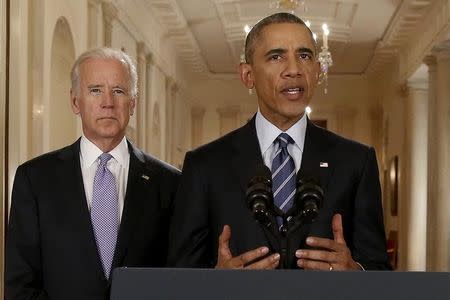Obama: Would be irresponsible to walk away from Iran deal

By Jeff Mason WASHINGTON (Reuters) - U.S. President Barack Obama heralded a nuclear deal with Iran on Tuesday as an opportunity for a new direction in the Middle East and warned Congress he would veto any legislation that prevented its successful implementation. Obama, speaking at the White House, said every pathway for Iran to get a nuclear weapon was cut off under the pact. The deal was built on verification, not trust, he said, and would be a mistake to reject. U.S. lawmakers have the right to review the pact and could sink it with a disapproval resolution that would eliminate Obama's ability to waive sanctions passed by Congress. Obama had a clear message for Republicans who may be considering such an option: don't do it. "I believe it would be irresponsible to walk away from this deal," he said. "Tough talk from Washington does not solve problems. Hard-nosed diplomacy, leadership that has united the world's major powers offers a more effective way to verify that Iran is not pursuing a nuclear weapon." Republican lawmakers and 2016 presidential candidates criticized the deal. U.S. Senator Bob Corker, chairman of the Senate's foreign relations committee, said he approached it from a place of "deep skepticism" and promised a rigorous review. Obama said the deal did not resolve all U.S. differences with Iran and noted Washington would maintain sanctions on Tehran for human rights violations and other issues. Despite the differences, Obama said the deal was a chance for change in the region. "Our differences are real and the difficult history between our nations cannot be ignored. But it is possible to change," he said. "This deal offers an opportunity to move in a new direction. We should seize it." The deal represents a foreign policy victory for Obama, who was criticized as a 2008 presidential candidate for proposing that the United States reach out to its enemies. Under the deal, formally announced in Vienna, sanctions imposed by the United States, European Union and United Nations will be lifted in exchange for Iran agreeing to long-term curbs on a nuclear program that the West and Israel have suspected was aimed at creating a nuclear bomb. Obama made his remarks in the same spot where he announced the death of former al Qaeda leader Osama bin Laden. Photographers used covered cameras to muffle the sound from their shutters and the few reporters permitted to watch were not allowed to bring cell phones or recording devices. (Additional reporting by Julia Edwards, Matt Spetalnick and Patricia Zengerle; Editing by Jeffrey Benkoe)

